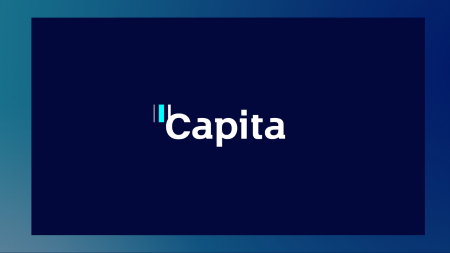The first GBC signatory: Guest blog from Capita CEO, Jon Lewis
Guest Blog from Jon Lewis
11th February, 2022
 In 2016, I returned to the UK, having spent the prior 20 years working internationally, but based in the US. It surprised me how many employees had negative perceptions of big corporate businesses in the UK, and that exposed me to the thinking at the time around being a responsible and purposeful business.
In 2016, I returned to the UK, having spent the prior 20 years working internationally, but based in the US. It surprised me how many employees had negative perceptions of big corporate businesses in the UK, and that exposed me to the thinking at the time around being a responsible and purposeful business.
Section 172 of the companies act emphasises the need for Boards to be ever more thoughtful of all stakeholders involved with that business, from suppliers, clients, communities and of course colleagues, and not just shareholders. I learnt about, and saw examples of, where businesses were purpose-led and realised that this enabled better outcomes for society which resulted in better outcomes for business. This included the good work of Business in the Community, Blueprint for Better Business, the Purposeful Company and of course, the Good Business Charter, all of whom I consult with.
It’s important to be really clear about the distinction between having a ‘purpose’ and being ‘purpose-led’. The question is whether the purpose of a business is to maximise profits for its owners (and we should be honest about that, if that is the case), or whether profit is an outcome of a business well managed and exists to serve a different purpose (i.e., purpose-led). Today more than ever, businesses are increasingly required to create value for its full range of stakeholders, through effective stakeholder capitalism, that is capitalism driven by mutually beneficial relationships between you and the stakeholders aforementioned.
When I joined Capita as CEO in 2017, being purpose-led become our North star. Capita had lost its way and needed cultural change to create a business that people were proud to be a part of, and given a sense of direction in terms of what we stand for. This resulted in the introduction of our purpose – creating better outcomes. In the spirit of being responsible, this was defined by a collection of our colleagues from across the organisation, not by the Executive Committee or Board. That said, in the first few months of its inception, our purpose-led approach was perceived by some to be my pet project. A few years on, and the feedback I receive now is that ‘if being purpose-led is a pet project, then let’s have more pet projects’.
Once our purpose was set, it was integral to demonstrate to our stakeholders how serious we were about being purpose-led. This meant executing on our purpose deeds – such as paying the Real Living Wage; fairly and openly paying our taxes; exceeding the requirements set by the prompt supplier payment code; improving our colleague parental benefits; or defining and having approved our Net Zero targets. We also were the first FTSE signatory of the Good Business Charter because we believed in what it stands for, and its 10 components provide all organisations with operating principles that I believe should define how all businesses work. Demonstrating fairness, equity, integrity, and environmental responsibility should be the norms by which we must live, not just aspire to.
Our commitment to the GBC and being purpose-led was tested robustly during the Covid-19 pandemic. For Capita, it meant prioritising the wellbeing of our colleagues, recognising the mental strain they were under. We ensured colleagues were financially secure by paying all UK employees not less than the Real Living Wage, adopting a virtual first approach very quickly, vaccinating colleagues in India and South Africa, but also supporting sole traders, small and micro-businesses, partnering with Microsoft and Google to support the DoEs efforts to provide digital learning tools to disadvantaged families, and, really importantly, doing business responsibly, and continuing to deliver for our clients. Of-course we’ll look back and reflect on what we could have done differently, and learn from that, but in as many ways as we could, our response to the pandemic was about trying to create better outcomes for all our stakeholders through a difficult time.
Fortuitously, our purpose-led approach has meant we’re now well positioned as it relates to our key markets, although this was not undertaken at the time for this reason. The Public sector is increasingly seeking social value in contracting work, and the private sector are wanting to work with companies who hold stronger positions in society.
As we look forward, it’s imperative that we continue to promote purpose. All our stakeholders are increasingly expecting us to be purpose-led. Our colleagues are looking to their managers and us as leaders, expecting us to think and operate responsibly, so are our clients, and citizens in the communities where we operate. More and more I think investors are coming to recognise that the cliche ‘doing good is good for business’ had truth in it. Even before the pandemic hit, whether these stakeholders talked about responsible business in the language of ESG, or fair pay, or paying fair tax, or modern slavery, or environmental protection, or diversity and inclusion there was a growing scrutiny on us at Capita (and all businesses) to be operating sustainably and responsibly. Covid amplified and accelerated those demands. I think the question we should be asking now isn’t ‘how realistic an ambition is it to promote purpose’, but ‘how realistic and sustainable is it NOT to be promoting purpose’.
About Jon Lewis
Jon Lewis was appointed Chief Executive Officer of Capita in December 2017. He has a track record of guiding large, multinational organisations through periods of significant change.
Jon is overseeing the transformation of Capita from traditional outsourcer to a consulting, transformation and digital services business.
Capita deliver innovative solutions to simplify the connections between businesses and customers, and between government and citizens. We partner with clients to transform their businesses and services, employing more than 50,000 people and touching the lives of millions of people.
Before joining Capita, Jon was CEO of Amec Foster Wheeler, where the transformation he oversaw culminated in a £2.2 billion acquisition of the business by John Wood Group. Previously, he worked for more than two decades at Halliburton, holding a number of senior management positions.
Over a 30-year career, Jon has worked in Europe, North America, Asia, the Middle East and Africa. He has expertise in strategy formulation, innovation through technology and the development of human capital.
Jon sits on the board of directors for Norwegian energy company, Equinor.
He holds a PhD from the University of Reading and is a graduate of the Stanford University Executive Program.



